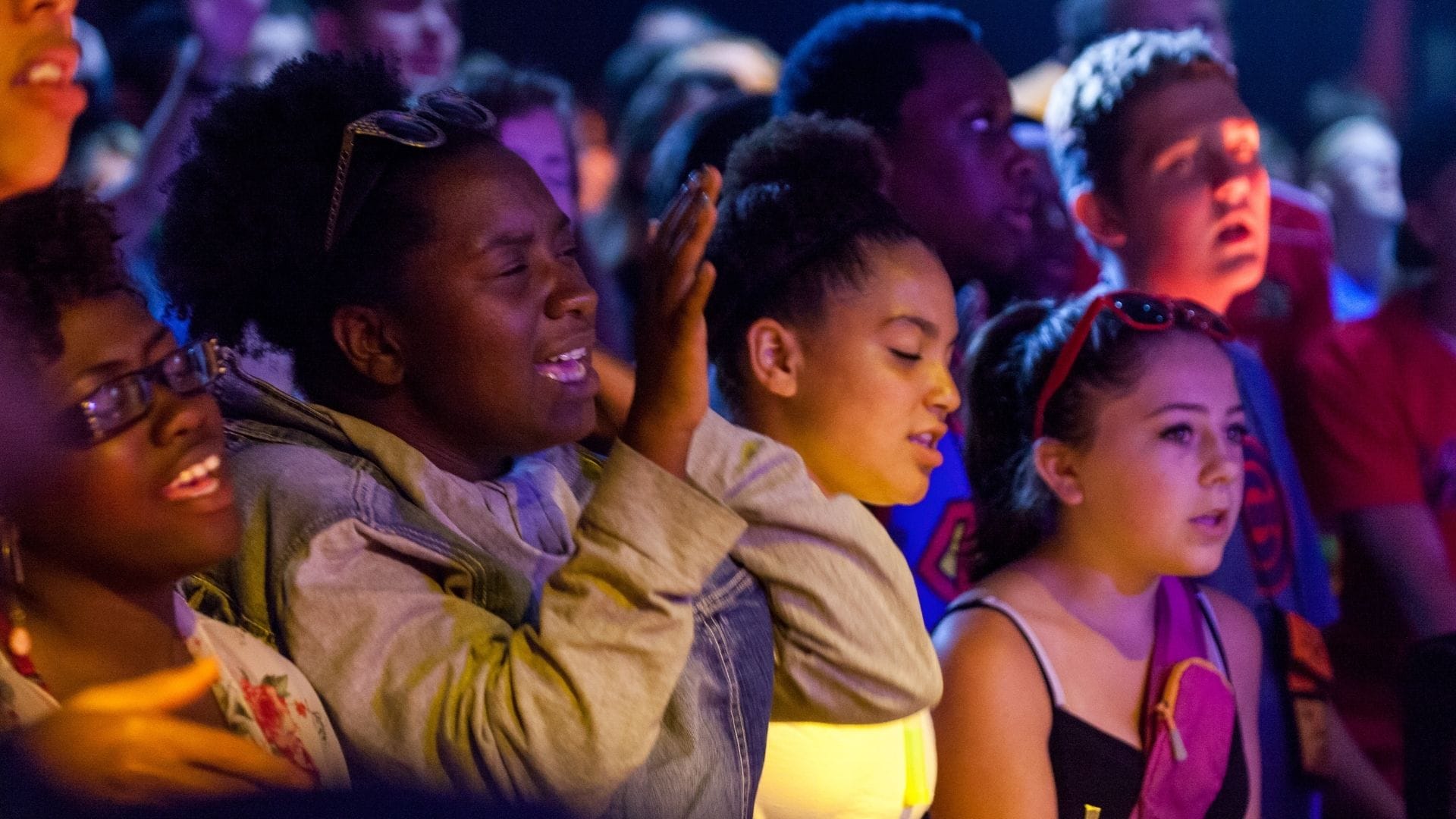The Companion sat down with Tim Ciccone, who serves as director of youth ministry for the Covenant, to talk about the history of the long-running youth event, Unite (formerly known as CHIC), how the pandemic changed its trajectory, and how the team is planning for the future.
Jelani: Can we start with the history of CHIC—how did this event begin? And where did the name come from?
Tim: When CHIC started in 1956, it was more of an east and west event. Approximately 250 campers met at Covenant Heights in Estes Park, Colorado, and another 250 met at Mission Meadows Covenant Camp in Dewittville, New York. The registration cost was $25 per camper. The name CHIC was an acronym that stood for “Covenant High in Congress.” It was originally a gathering where youth groups would send representatives and vote on a president and vice president. I think every church sent two or three students, and they came together to worship and listen to teaching, conduct business meetings, and vote on ministry-based items.
It was like a Covenant youth annual meeting?
Somewhat, yes. It had a more formal agenda compared to today’s expression of the event.

In 1972, the decision was made to bring the east and west CHIC groups together to form one event. That year those in leadership made the decision to change how the music and worship times were led, which opened the door for Bob Stromberg, who was a North Park student and Young Life leader, to come and be the song leader. He ended up leading worship for CHIC for over three decades! The discipleship nature of the event started to shift, which had a great impact on Covenant churches. The event began to grow, and in 1993 the decision was made to change the name from Covenant High in Congress to Covenant High in Christ.
At that time, the acronym “CHIC” didn’t carry the same connotation as it does today.
It was not associated with the slang term “chick”?
Not really. We were seeing massive growth in youth ministry across North America as well as in the Covenant in general. In the ’90s and 2000s, we also saw wonderful growth in diverse communities. As the denomination expanded, the name CHIC became confusing for a lot of people. I’ve heard from youth leaders over the years who told me they didn’t use the name CHIC to promote the event because it was creating confusion in the congregations they served.
Around the turn of the century, as more and more people started using the internet, people would Google the word “CHIC,” and they would see some unsavory results.
Actually, at CHIC 2000 (CHIC 2K) there was a public discussion and a vote to change the name at the event.
Yeah, I remember that. I think they were considering the names Trek or Quest as alternatives?
Something like that, yeah. But the CHIC 2K students revolted! That effort to change the name in 2000 never took root. In 2019, we finally decided to retain the value and history of what CHIC represented but to change the name to something more welcoming and inviting, especially to our ever-expanding Covenant church community.
Being the word nerd that I am, I remember when I first heard about CHIC—I actually saw it written before I heard it said, so I assumed it was pronounced like the French word chic. I was like, “Oh man, the Covenant’s styling, like, all right, right on.”
People still send me messages or posts on social media saying, “Bring CHIC back,” and that’s not lost on me. I understand the feelings around it. I also think we live in a particular day and age, more and more of a post-Christian culture where the church has the opportunity to find new ways to reach people for Jesus.

We believe the name “Unite” encompasses the value of this broader youth ministry gathering that’s for Christian teenagers and non-Christian teenagers alike. It’s a mobilizing statement that invites students to go deeper in their faith with Jesus and also dig into their calling to the world, humbly leading their communities to Jesus through ministries of justice and service, care and compassion.
Especially in this politically polarized world, the word Unite seemed perfect. We have all heard stories of Christian movements in history that have started with teenagers. So we felt like it was a perfect time to call the Covenant’s youth movement “Unite” because we’re focused on uniting around the purposes of God.
How did you come to be involved?
I grew up in the Covenant. My family and I started attending a Covenant church in 1977 in large part due to my mom being invited to a women’s ministry retreat at Covenant Pines Bible Camp in Minnesota. I attended CHIC with my youth group as a student in 1991 and have been to every CHIC since.
Wow.
God has used Covenant youth ministry and the ministry of CHIC to literally change my life. I received a strong calling to ministry at CHIC ’91. My faith was certainly deepened when I was a student there. And over the years of being a youth worker and bringing students to CHIC, I have seen so many lives change, so many teenagers called into ministry at CHIC events. In 2007, I was asked to be on the planning team for CHIC 2009, which felt like a great honor because this event had made such a difference in my life.
I was on the CHIC planning team in 2009, and then again in 2012. By 2015, I was in my current role as director of youth ministry for the Covenant. CHIC 2018 was amazing—and then this last season has been especially complicated. The pandemic has changed everything.
Can you walk us through that from a big-picture standpoint? What happened after CHIC 2018, which was branded with the theme “Unite”? The protocol would’ve been to have another one in 2021, since they’re usually three years apart. Did everything start to shift in 2020?
Yeah, we had actually a signed contract in hand with the University of Tennessee for Unite 2021. The event was scheduled, we had published the dates, and the website was updated. Our churches knew what to plan for—and then the pandemic began in March 2020. When we all began to work from home that March, we thought it would be a two-week hiatus. But of course, that turned into a yearlong Covid lockdown. Sometime later that spring, we started having the complicated conversation, asking, “If we’re still in lockdown, how are we going to proceed with this event?” Even if we were not in lockdown anymore, what would be the long-term impact on a large-group event like this? There were so many unknowns.

That conversation entails several different dimensions. The local youth worker and volunteer leaders are trying to figure out how to get their students to an event, in some cases, across the country. Some churches are fundraising years in advance, so if they’re in lockdown, how are they going to raise the funds to get there?
We were also worried about budgetary constraints for churches. Some churches had to limit their staffing structures during the Covid-19 lockdown, which impacted youth ministry efforts. How would it look to charge them for an event as they are trying to reimagine their own financial future? Also on our end, and to make it more complex, we had a signed contract with the University of Tennessee that required a minimum number of registered students that we were financially responsible for regardless of how many actually showed up.
We have a Unite executive team made up of about eight people who understand the denominational nuances in play as well as the comings and goings of youth ministry across the Covenant. In collaboration with that team and a number of other key leaders, we made the hard decision to postpone Unite 2021 for a year.
That was a hard decision. It was met with understanding from different communities, but also a lot of frustration.
Some of that frustration was pointed at us, but more was directed at the pandemic in general. We’re experiencing a whole generation right now who’s reeling from having everything canceled, from sporting events to dances and proms. Thankfully we are starting to come out of that hard season.
To make it even more complex, the denominational staff has been in a season where several key leadership transitions have created an interesting dynamic in long-term planning for denomination-led movements like Unite.
All the different waves of the pandemic over the last two years have made it so hard to predict what would happen. At one point it looked like we might be able to actually start planning Unite 2022 with confidence. Then the next month another variant would hit, and the schools were back in lockdown again.
We were thinking long and hard about what it would be like to have 5,000 people in an arena in Tennessee in the middle of summer. We just didn’t know what would happen, the unknowns were crushing, so we had to make the sad decision to cancel the Unite event again in 2022.
Wow, that must have been so hard.
Yeah, it really was. It still is.
But with that cancellation came the dawn of a new idea. We went to several regional conferences and said, “If you have the resources and the people and the timeline to be able to do a conference-wide event, perhaps this is something that your local youth workers could bring together.” A regionally focused event gives churches so much more flexibility in the event the pandemic rears its ugly head again.
We understood that not every conference would be able to do this, but the celebration is that this summer a number of churches from across the Covenant will be attending one of several regional events in July.
Looking at these smaller-scale events, does that give you some hope? I mean, it’s not the big thing, but it’s not nothing.
Yeah, it does give me hope. We are glad that conferences are collaborating for these regional Unite-like events, and we are very interested in learning how these events meet the needs of our local churches and conferences.

That brings us to the issue of access. For the last 15 to 20 years, we’ve really wrestled with the big question of who has access to CHIC and events like CHIC in the Covenant. We want every high school student who desires to come to be able to attend. We really believe that, at CHIC/Unite, we see the best the Covenant has to offer from a kingdom perspective, and we want to do our best to give every student an opportunity to attend.
But there are barriers—financial and geographical. For churches in Canada or in the villages of Alaska, or along the West Coast, it’s a long way to travel to the University of Tennessee. So access is a significant concern.
And while the five regional events planned for this summer don’t necessarily answer that question for every student in the Covenant, we’re certainly getting closer to what could look like a solution. Our hope is that this summer more students will be able to dive into this Covenant youth discipleship experience than if we were all going to Tennessee.
And frankly, I’m just so proud of the youth leaders and regional leaders who have mobilized to pull these events off. I am so thankful for these people! They are the true heroes because it takes a ton of work to pull these events off. And I’m very thankful for our superintendents who have supported this effort.
It seems like this is a time of both transition and opportunity. It’s difficult to feel like you’re losing something, but given what you said about access, this is also a chance for students, churches, and families to experience something new, especially compared to the denomination-wide gatherings of the past. In this season of change, there are probably a lot of folks who are curious, opinionated, and full of suggestions like, “Well, what the Covenant oughta do is X, Y, and Z.” What would you say to those folks? What’s the best way to marshal some of that energy?
Change theory says we resist change because we don’t want to lose something. I want people to know that I don’t want to lose the significance and influence that CHIC has had over so many decades. We’re not trying to change that. But we are responding to a very difficult moment in history and ministry and at the same time trying to be good stewards of this call.
With that in mind, we have a great opportunity to learn from these regional expressions this summer. As the body of Christ, I would encourage us all to be patient with one another, to think the best of those who are trying to make difficult and good decisions for the church, and to participate in supporting the forward momentum of reaching this generation for Jesus.
We don’t know what the future of a denomination-wide youth ministry expression will look like yet. Just because we’re doing these regional events doesn’t necessarily mean we’re locked into a regional mindset for the future. We are praying, discussing, and looking toward where the Spirit is leading, together.
The Covenant value for youth ministry is alive and well! We have amazing people doing great work with teenagers, with the emerging generation, and with young people in general. So I invite the readers of this interview to support these regional gatherings and to pray for the various regional, conference, and denominational teams making decisions around the future of Unite. Please pray that we continue to see new life in Christ in the teenagers whom we are so fortunate to serve. And pray that God grants a grand vision for the future and that in all things God gets the glory.
For more info on the five regional Unite-themed gatherings happening in July 2022, head to https://www.unite2022.org .














